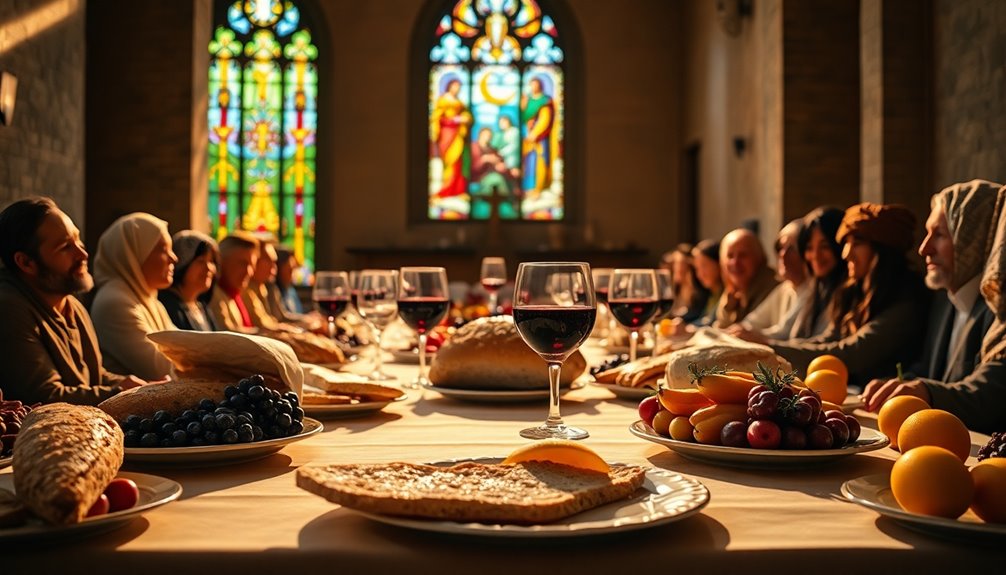The Last Supper is significant for several reasons. First, it establishes Holy Communion, where bread and wine symbolize Jesus' body and blood, embodying the New Covenant. Second, it occurs during Passover, linking liberation from sin to Israel's freedom from Egypt. Third, it emphasizes community, as believers gather to share in this sacrament. Fourth, it serves as a powerful act of remembrance, reinforcing unity among followers. Lastly, understanding its deeper meanings can transform your view of faith. There's much more to discover about the Last Supper's impact and lessons, so keep exploring this profound event.
Key Takeaways
- The Last Supper establishes the New Covenant, symbolizing Jesus' sacrifice for salvation and redemption for humanity.
- It coincides with Passover, representing liberation from sin and fulfillment of the Exodus story through Jesus as the Passover lamb.
- Communion serves as an act of remembrance, fostering a transformative relationship with God and highlighting community and fellowship among believers.
- The event emphasizes love, service, and forgiveness, which are foundational aspects often misunderstood in contemporary interpretations of Communion.
- Participation in Communion reflects unity in faith, inviting all believers to share in the grace and forgiveness represented by bread and wine.
Introduction

The Last Supper holds immense significance in Christianity, marking the final meal Jesus shared with His disciples before His crucifixion. This pivotal event occurs during the Jewish Passover, a time that symbolizes liberation from sin and the establishment of the New Covenant through Jesus' sacrifice.
As you reflect on the Last Supper, consider how it transformed the meanings of bread and wine. Jesus took these ordinary elements and redefined them to represent His body and blood, which are central to the practice of Communion in Christianity.
Moreover, the Last Supper embodies Jesus' teachings on servanthood and forgiveness. By washing the feet of His disciples, He illustrated the importance of humility and service to one another. This act serves as a powerful reminder for you to embrace these values in your own life.
The event is foundational for Christian beliefs about salvation, reinforcing the idea that Jesus' death and resurrection offer redemption. As you commemorate the Last Supper in the Lord's Supper, you participate in a tradition that fosters community and spiritual unity among believers, connecting you to the core of Christian faith and the promise of eternal life.
Scriptural Basis for Communion
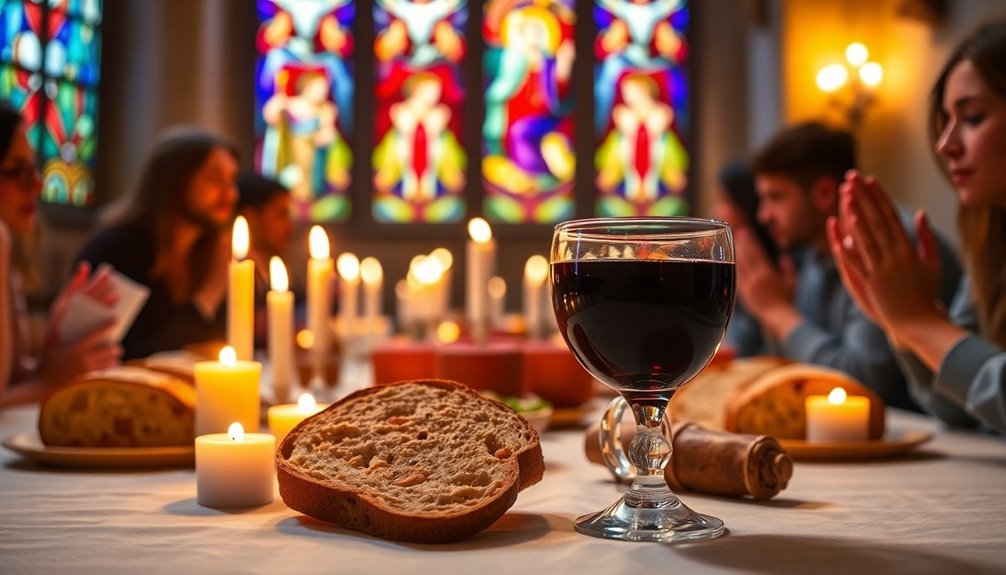
When you explore the scriptural basis for Communion, you'll find that the Last Supper is pivotal, as recorded in the Synoptic Gospels.
Jesus' words about the bread and wine lay the foundation for this sacred practice.
Additionally, the Apostle Paul's teachings further highlight its significance in remembering His sacrifice.
Primary Bible References
Primary Bible references provide a solid foundation for understanding the significance of Communion in Christian practice. The Last Supper, recorded in the Synoptic Gospels—Matthew 26:17–30, Mark 14:12–26, and Luke 22:7–30—establishes the scriptural basis for this sacred ritual.
During this pivotal meal, Jesus took bread and wine, blessing them and declaring they represented His body and blood, as noted in Luke 22:19-20. This act instituted the sacrament of the Eucharist and symbolizes the establishment of a new covenant, echoing Jeremiah 31:31.
When you participate in Communion, you're not only recalling the Last Supper but also affirming the transformative relationship between God and believers. Jesus' declaration of the new covenant during the meal signifies a shift from the old covenant to one characterized by grace and forgiveness.
Paul reinforces this in 1 Corinthians 11:23–26, urging you to remember Jesus' sacrifice through the act of Communion, making it a proclamation of faith. Each time you break bread and share wine, you're engaging in a powerful reminder of His love and commitment to redeeming humanity.
Secondary Bible References
Many believers find deeper meaning in Communion by exploring secondary Bible references that enrich their understanding of this sacred practice. The Last Supper, as recorded in the Synoptic Gospels, serves as a pivotal moment, establishing a biblical foundation for Communion.
In 1 Corinthians 11:23–26, Paul underscores the importance of remembering Jesus' sacrifice through the breaking of bread and sharing of the cup. Jesus' directive during the Last Supper, "This is my body given for you; do this in remembrance of me" (Luke 22:19), solidifies the memorial significance of this act.
Moreover, Luke 22:20 highlights the transformation of the Passover meal into the Eucharist, where Jesus introduces the cup as "the new covenant in my blood." This signifies the shift from the old covenant to the new, underlining the profound implications of Communion.
Additionally, in John 6:53-58, Jesus identifies himself as the "bread of life," linking the act of eating and drinking with spiritual sustenance and eternal life. These references deepen your appreciation of Communion, reminding you of its connection to the Last Supper and the significance of Jesus' sacrifice.
Jewish Passover Traditions Influence
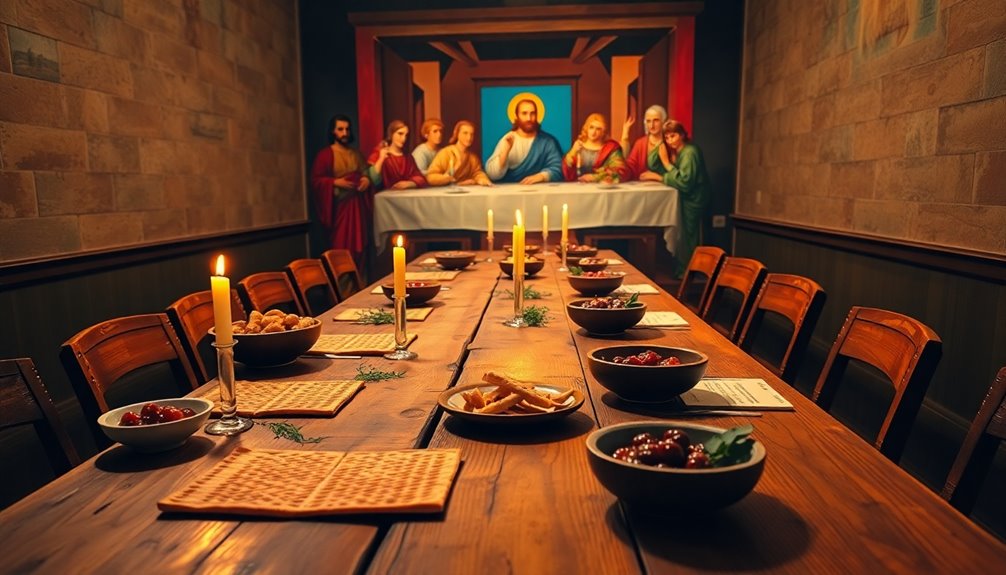
The profound influence of Jewish Passover traditions on the Last Supper highlights a rich tapestry of faith and symbolism. The Last Supper took place during Passover, a time when families gather to commemorate the liberation from Egyptian slavery. This shared meal prominently features unleavened bread and wine, symbols of suffering and redemption. Jesus repurposed these elements, transforming them into profound representations of His new covenant.
During the Seder meal, the Exodus story is told, aligning closely with the message Jesus conveyed at the Last Supper. As He broke the unleavened bread, He declared it to be His body, and the wine became His blood, fulfilling the symbolism of the Passover lamb. This act foreshadows Jesus' death, marking the ultimate sacrifice for humanity.
The Last Supper serves as a bridge between Jewish Passover traditions and Christian Eucharistic practices, emphasizing themes of freedom and divine promise.
Symbolism of Bread and Wine
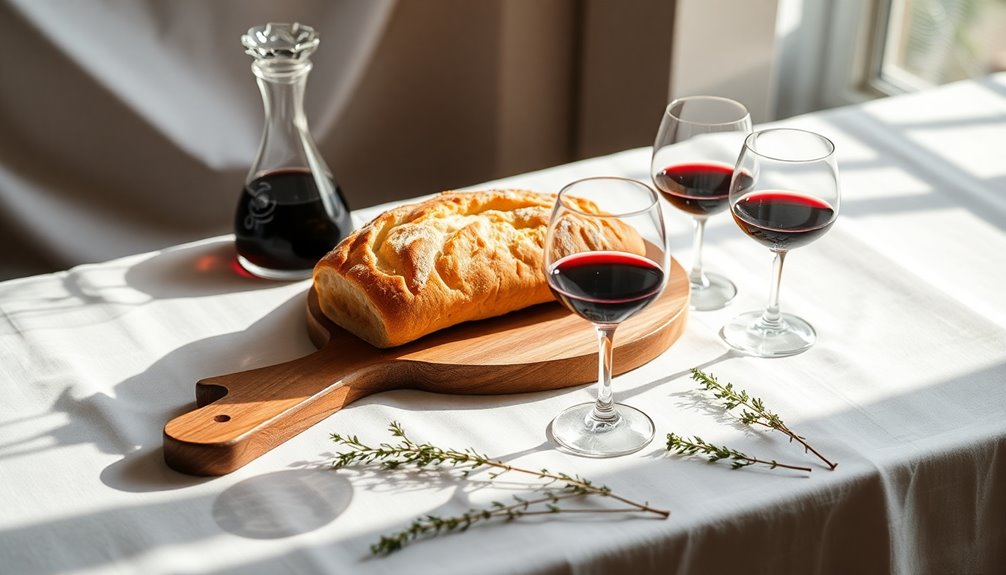
What deeper meanings can we uncover in the bread and wine shared at the Last Supper? In this pivotal moment, Jesus redefined bread as His body and wine as His blood, creating profound symbols of His sacrificial love.
The bread represents spiritual sustenance, echoing His teaching that He's the "bread of life," offering eternal nourishment (John 6:35). As you partake in this sacred act, you're reminded of Jesus' ultimate sacrifice and the New Covenant established through His crucifixion (1 Corinthians 11:23-26).
The wine signifies atonement for sins, drawing from prophetic imagery in the Old Testament regarding sacrifice and redemption (Hebrews 9:22). This sharing of bread and wine during the Last Supper emphasizes community and fellowship among believers, reinforcing unity in faith (Matthew 26:29).
You're not just consuming elements; you're partaking in a shared promise and a deeper connection to Jesus' sacrifice.
Through this ritual, the bread and wine transcend their physical forms, embodying the essence of Jesus' love and commitment to humanity. They serve as enduring reminders of His call to live in harmony and faithfulness as part of the New Covenant.
Misunderstanding Communion's Purpose

When you think about Communion, it's easy to see it as just another ritual, but that misses its deeper purpose.
Jesus intended it to be a powerful reminder of His sacrifice and a way to connect with the community of believers.
Let's explore some common misconceptions that can cloud your understanding of this sacred practice.
Debunk Common Misconceptions
Communion is often misunderstood as just another ritual in the church, but it holds deep significance as a vital act of remembrance and participation in Jesus' sacrifice. Many people see it merely as an individual reflection, failing to recognize that Communion is also a communal act reinforcing unity among believers.
At the Last Supper, Jesus invited all His disciples, symbolizing the inclusivity and community that the meal represents. Some think that only certain individuals can partake, but Jesus' invitation underscores that everyone is welcome. This meal embodies a shared faith and collective remembrance of Christ's sacrifice.
Additionally, while the bread and wine are often viewed as mere symbols, they actually represent the New Covenant Jesus established, offering grace and forgiveness to all who believe.
Lastly, it's a misconception to see Communion as a historical event alone. Instead, it's a living practice that connects you to the transformative power of Jesus' love, encouraging ongoing commitment to His teachings.
Understanding these elements enhances your appreciation for the significance of Communion in your faith journey.
Misinterpretation of Jesus' Intentions
Though many approach Communion as a mere ritual, understanding Jesus' true intentions reveals its profound purpose. During the Last Supper, He established a New Covenant, inviting you into a deeper relationship with Him and emphasizing the importance of love, service, and forgiveness.
Unfortunately, a common misunderstanding is interpreting the symbolism of bread and wine as a literal transformation rather than recognizing it as a call to remember and actively participate in this covenant.
When you treat Communion solely as an obligation, you risk overlooking its communal aspect. This sacrament is meant to reinforce unity among believers, reflecting the inclusive nature of Jesus' invitation to His table. Misinterpretations can lead you to focus on individual piety instead of embracing the collective experience of faith that Jesus intended.
Additionally, the Last Supper's connection to Passover is often overshadowed by traditional practices, neglecting the significance of liberation from sin.
Everyday Acts of Service

Everyday acts of kindness can transform your community, just as Jesus demonstrated during the Last Supper.
By engaging in local outreach initiatives, you embody the spirit of service He called for, creating a ripple effect of love and support. Participating in community events can strengthen family bonds and promote local engagement within your neighborhood.
Daily Acts of Kindness
Often, small acts of kindness make a big difference in our daily lives. Engaging in daily acts of kindness, like helping a neighbor with groceries or writing a thank-you note, fosters a stronger sense of community and connection.
These simple gestures can create a ripple effect, inspiring others to spread positivity and participate in acts of service. Research shows that performing small acts of kindness not only boosts happiness for both the giver and the receiver, but it also promotes mental well-being.
When you help others, you decrease your own stress and anxiety levels, enhancing your overall satisfaction with life. Imagine the impact of regularly complimenting someone or lending a helping hand; these small actions can significantly improve someone's day and encourage a culture of positivity. Additionally, studies indicate that positive thinking correlates with lower risk of chronic diseases, further highlighting the importance of kindness in our lives.
Local Outreach Initiatives
Local outreach initiatives bring communities together through shared acts of service, embodying the spirit of the Last Supper. These initiatives often involve community meals, where the emphasis is on sharing and fellowship. Just like the meal Jesus shared with his disciples, these gatherings reflect humility and the importance of serving others.
Many churches organize food drives and soup kitchens, providing nourishment that echoes the symbolism of bread and wine as sustenance for both body and spirit.
You can participate in hands-on service through outreach programs, fostering connections among congregants and neighbors. This communal aspect mirrors the Last Supper, where togetherness was paramount.
Additionally, educational workshops and seminars teach the values of forgiveness and reconciliation, drawing from the Last Supper's lessons to promote healing within your community.
Collaborative efforts with local organizations tackle pressing issues like food insecurity and homelessness. By engaging in these outreach initiatives, you reinforce the messages of love, acceptance, and support that the Last Supper embodies.
Each meal shared or act of service rendered contributes to a stronger, more compassionate community, reminding everyone of the profound impact of coming together. The spirit of unconditional love fosters deeper connections, encouraging individuals to uplift one another through service.
Final Thoughts on Communion

In reflecting on the profound significance of Communion, it's clear that this sacred ritual not only commemorates Jesus' sacrifice but also serves as a vital connection among believers. The Last Supper established the sacrament of Holy Communion, where Jesus symbolized His body and blood through the bread and wine shared with His disciples. His command to "do this in remembrance of me" underscores the importance of reflecting on His death and its significance in your life.
As you partake in Communion, you remember and participate in the new covenant that Jesus initiated. This act isn't just a personal reflection; it's a communal experience that fosters unity among Christians, reinforcing your shared faith and commitment to His teachings. It encourages you to engage deeply with your spiritual life, prompting self-examination and repentance in light of His sacrificial love.
Moreover, Communion resonates with the hopeful anticipation of the future meal described in Revelation, symbolizing the fulfillment of God's promises and the hope for eternal life.
Ultimately, Communion invites you to connect with Jesus, your fellow believers, and the transformative power of faith.
Additional Resources
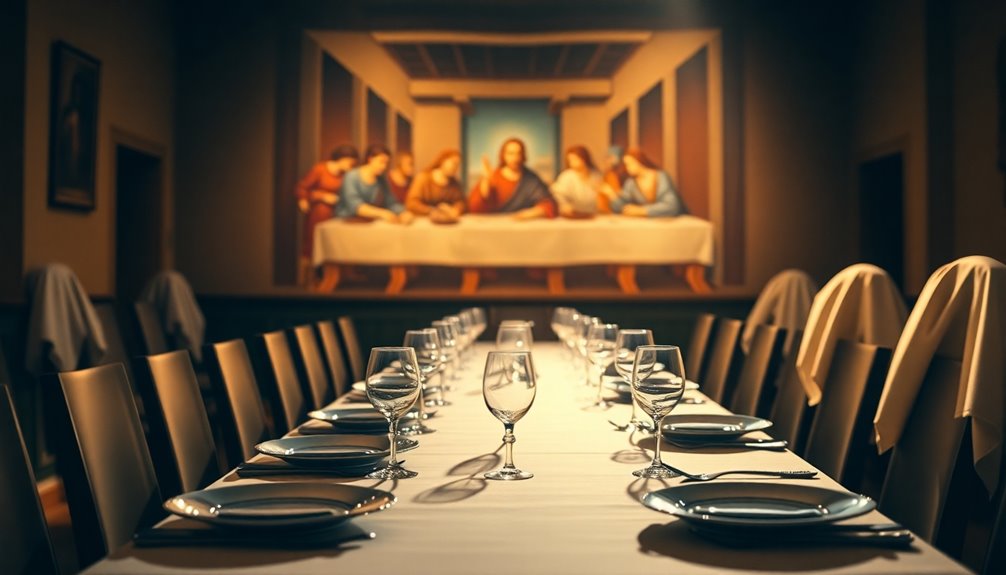
Exploration of the Last Supper can be enriched by a variety of resources that deepen your understanding of its historical, theological, and artistic significance.
Start with the Synoptic Gospels—Matthew, Mark, and Luke—where you'll find the foundational account of the Last Supper, highlighting its role in the institution of the sacrament of Communion. These texts underline the new covenant established by Jesus, transforming traditional Passover symbols into representations of His body and blood.
Artistic interpretations, such as those by Leonardo da Vinci and Tintoretto, offer visual insights into themes of betrayal and community surrounding Jesus' death. These masterpieces can help you appreciate the emotional depth and significance of the event.
Additionally, scholarly articles and theological commentaries explore Jesus' teachings during the Last Supper, emphasizing humility, servanthood, and forgiveness among His followers.
You might also consider attending discussions or lectures at your local church or community center, which often delve into the Last Supper's ongoing influence on faith practices.
Frequently Asked Questions
What Are the Three Significances of the Last Supper?
When you think about the Last Supper, you can see three key significances.
First, it establishes a New Covenant, transforming the Passover meal into a symbol of Jesus' sacrifice.
Second, it emphasizes servanthood, as Jesus humbly washes His disciples' feet, teaching you the value of serving others.
Lastly, it serves as a powerful reminder to remember Jesus' sacrifice, reinforcing your connection to His mission and the promise of salvation.
Why Is the Last Supper so Significant?
The Last Supper's significance lies in its deep symbolism and the lessons you can draw from it.
It's a moment of unity, where you witness Jesus' teachings on love and servanthood. By sharing a meal, you connect with others in a profound way, reflecting on forgiveness and sacrifice.
This gathering encourages you to remember the importance of humility and community, guiding your actions and relationships in everyday life.
What Is the Significance of the Lord's Supper?
The significance of the Lord's Supper lies in its role as a powerful reminder of Jesus' sacrifice.
You participate in this sacred act to deepen your connection with Him and fellow believers. Each time you share the bread and cup, you engage your senses and reflect on His love and faithfulness.
This practice not only fosters community but also anticipates the promised future meal with Christ, instilling hope and unity among all participants.
What Was Jesus' Message in the Last Supper?
During the Last Supper, Jesus conveyed a powerful message about love, sacrifice, and community. He broke bread and shared wine, inviting you to remember His impending sacrifice and the new covenant it represents.

